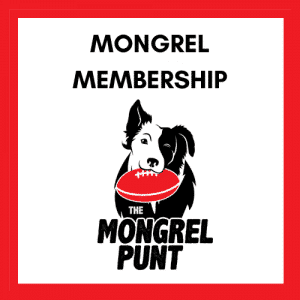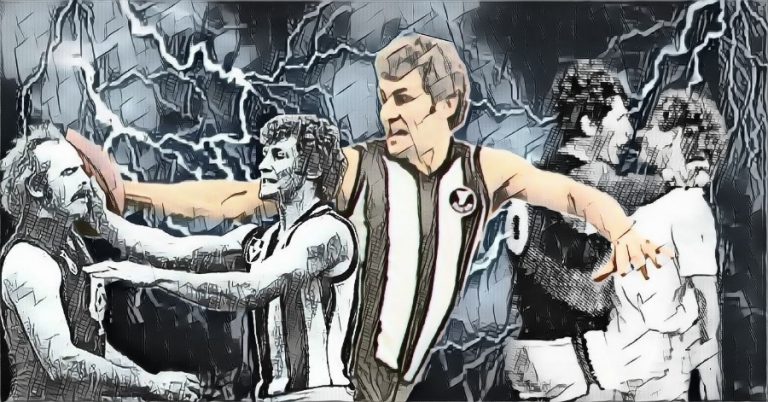When you ask Dermott Brereton who his favourite player was growing up, he answers without hesitation – Phil Carman.
It kind of explains a lot, doesn’t it?
Carman was Brereton before the man with the dyed-blonde hair sported the number 23 guernsey for the Hawks, and he was more – much more. A prodigious talent, Carman was like an unbroken stallion, unable to conform to a set of rules that are relaxed by today’s standard. He would bounce from Norwood in the SANFL, where he played against the greats like Ebert, Robran and Cornes, to make his VFL debut for Collingwood, before moving to Melbourne, then Essendon, before finally finishing up at North Melbourne.
Carman was a phenomenon in the SANFL, at a time when he could still be controlled. Initially in Collingwood’s zone, the Pies did not immediately recruit Carman, and Carman had no real desire to play anywhere but Norwood. It eventually become an intense standoff between the VFL’s biggest club and the Redlegs.
Norwood was able to stifle Collingwood’s attempts at blocking Carman from playing – reports suggest sums of money to hold up paperwork could have played a big part in the delay – and Carman debuted for the Redlegs in 1970 – best on ground in his first game, and sign of things to come.
The Pies refused to take the SANFL’s decision to grant Carman a permit to play and challenged the decision, winning and leaving the star youngster in a predicament. He could come and play for Collingwood, or sit out of footy for two years.
“I had to stand out of footy for two years,” said Carman in Matt Watson’s book, Fabulous Phil.
It was only when Carman hurt his knee – the circumstances surrounding the injury are still unclear – that Collingwood lost interest and allowed him to be cleared to Norwood. It also saved them from having to pay for his medical bills and rehabilitation. In the 70s, a knee injury often spelt curtains – that’s what the Pies thought was the case with Carman. They gave up on him, and saved a few bucks in the process.
Two years in the SANFL saw Carman’s rugged and sometimes “over-enthusiastic” approach to physical matters on the field land him in trouble a couple of times. There was no doubt he was a star, and bound for big things, but by the end of 1974, his time at Norwood was at an end. And after all the constraints Collingwood had placed on him – right or wrong – it was still the Pies Carman eyed off when contemplating a move to Victoria.
His debut season for Collingwood remains his best, and perhaps one of the most impressive debut seasons of all time.
We tend to get caught up in the exploits of the more recent players to hit the league, but Carman’s debut season was something else – he captured the Copeland Trophy in 1975, kicking 41 goals and averaging 19 touches per game.
Oh, he also only played 15 games that year, a broken bone in his foot sitting him for close to eight weeks. He also finished just three votes behind eventual Brownlow winner, Gary Dempsey. I suppose the closest thing we’ve seen to that amazing feat is the debut season Sam Walsh, or maybe Nick Daicos this season… if Walsh had finished three votes behind Nat Fyfe in the Brownlow, or if Nick Daicos manages it this season.
It’s not going to happen, but it gives an indication just how good Carman was when he first strode out to play VFL footy.
Sadly for Carman, that was to be the best season of his VFL life, with his indiscretions becoming more of a story than his positive contributions.
Carman was suspended for the 1977 Grand Final after whacking Michael Tuck of the Hawks in the second semi-final. It cost him a chance to play in both the drawn Grand Final, and the rematch the following week. Given Carman’s form line in the lead-up, with four goals in that semi-final, it is quite feasible to think that he may have been able to sway the result in that first game with a bit of ‘Fabulous Phil’ magic.
Instead, Carman moped about the club, leaving training early the week of the first Grand Final – something that was not lost on Tom Hafey. Several players (Peter Moore, Rene Kink) felt Carman had let the team down with his attitude, which rubbed off on some of the younger players who were also not going to be given a chance in the Grand Final.
As the Pies got ready for the first-ever Grand Final Parade, Carman headed home to Lilydale.
In the Grand Final replay, Collingwood closed the gap to just two goals late in the game. Collingwood needed something special – something amazing, and they needed someone capable of delivering it. Sadly, Carman sat on the bench, watching his team fall without him. He had appealed his suspension earlier in the week, on the grounds the initial penalty was for the Grand Final, and Round One of 1978, but the tribunal weren’t about to be beaten by a technicality, and upheld the suspension for the Grand Final replay.
“If we had Phil in our side, we would’ve had a better chance at winning,” Ray Shaw.
Despite being named Vice Captain at the beginning of the 1978 season, Carman did himself no favours. His form was great, but his knees were hurting and some days he’d just call the club instead of coming in.
“I’d just ring up and say I wouldn’t be in. They obviously didn’t take that too well.”
Carman’s relationship with Collingwood coach, Tom Hafey soured drastically in 1978. Carman had ideas on how and where he should play – Hafey was simply not interested. It got to the point where Carman’s wife went to the press and stated that Hafey was ruining his career.
Imagine an AFL WAG trying that shit now?
Injury continued to hamper Carman, and it was impacting him in a lot of ways. He had an altercation with Collingwood fans after limping from the ground in Round 16. After being heckled, Carman lashed out.
“I didn’t hit either of them. I just flicked my hand at a man and knocked a can of beer out of his hand.”
The Pies beat Carlton in the Semi to earn a Preliminary Final berth, but just like 1977, Carman was in the news for the wrong reasons. He got away with whacking Vin Catoggio but was pinged for striking Rod Ashman. Luckily for him, he avoided another crucial suspension, being cleared in what was described at the time as a ‘nothing’ incident. He was lucky he wasn’t cited for the Catoggio hit. Vin woke up the next day with two black eyes.
The next week, Collingwood bowed out of the 1978 finals series.
North Melbourne rated Carman’s ability to influence a game so highly that he found himself the subject of a tag in the Preliminary Final. The tagger? Oh, only dual Brownlow Medallist, Keith Greig.
After a season on the books at Melbourne where he kicked 23 in 16 games, Carman made the move to Essendon, and engaged in perhaps the most notable incident in the Phil Carman history.
Carman was reported for head-butting boundary umpire, Graham Carbery. At a stoppage in the forward pocket, Carman decided to give Gary Sidebottom of St Kilda a bit of a love tap to the head. Field umpire, John Morgan reported Carman immediately.
“I thought fair enough, dickhead. He obviously saw it.” – Carman.
Carbery saw it too, and ran in from the boundary to make a report, as well. Carman didn’t appreciate the extra attention, poked a finger into Carbery’s chest and yelled “You didn’t see a f*cking thing, you f*cking mongrel c*nt.”
How’s that for dissent! Maybe he meant Mongrel Punt?
Carbery yelled back at Carman, and many over the journey have speculated that Carbery got too close to Carman as tensions ignited.
“In frustration, I put my head down to get him out of the way. It wasn’t a real severe head-butt.” – Carman.
Carman said that Carbery had put on an act.
“Then I stood in front of him again and I said I am reporting you for striking me.” – Carbery.
Carman then told Carbery to “f*ck off” before throwing his arm out and hitting Carbery with a backhander.
“I just went f*cking wang and threw my left arm back. I really hit him again.” – Carman
Carbery’s actions were the source of much debate from players both respected and maligned.
“If you look at the footage, Carbery is right in his face. An umpire wouldn’t do it now. Chesting him, in his face, yelling at him.” – Essendon Legend, Simon Madden.
“Phil Carman should have an apology by the AFL for what happened there. He got in Phil’s face. Phil was a person that you didn’t get into his face.” – Crackers Keenan.
In a fiery hearing, Carman was suspended for a total of 20 weeks – four for the strike on Sidebottom, and 16 for the head-butt on Carbery. Four games into 1980, Carman’s season was over. Averaging 19.75 touches and 1.75 goals per game, Essendon were now without their star recruit. It would the lasting image of Carman’s career.
He would go onto play six games for the Bombers in 1981 before finishing his VFL career with North Melbourne in 1981. Playing alongside fellow South Australian, Malcolm Blight, as he went on to kick 103 goals and win the Coleman Medal, Carman chipped in with a very handy 27 goals in 13 games for the season.
Carman’s time in the game at the highest level was done. He meandered about a little, spending time in Canberra and Bendigo before putting his hand up to coach struggling SANFL side, Sturt. The club was on its knees when Carman joined. Taking very little money, this was Carman giving back to the game.
He would routinely beat all his players in time trials, retaining his incredible athleticism well into his forties, and setting the standard his players had to follow.
“Every week the old fella with this big moustache, you’d hear him puffing from a mile away. He’d mow down everyone. I never got near him. He could have been an Olympic athlete if he chose not to be a footballer – Chris Thredgold, Sturt captain.
Though Carman would again fall agonisingly short of a premiership, his efforts to breathe life into Sturt and take them to the 1998 Grand Final against Port Adelaide are how many choose to remember him.
He was a player of immense talent, a player who prompted a tug-of-war between Norwood and Collingwood, a flawed genius who wowed in his first season of VFL football and as he has heard so often “cost Collingwood a premiership”. He was aloof, ahead of his time, and played with a passion and flair that made him stand out from the pack.
Phil Carman was a standout at every level of football he played. Whether you choose to remember him as the villain that head-butted an umpire, or the hero who saved Sturt, Carman remains a huge figure in football history.


